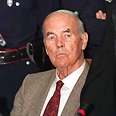
Priebke
צילום: AFP
Europe, Priebke and Jews
Op-ed: Step between democratically opposing Israeli policies and calling Jews descendants of apes and pigs is a small one
A number of recent events have proven once again that Europe is still struggling with its past, a violent past whose legacies are closely linked with the renewal of anti-Semitic tendencies. In the old continent, the hatred against Jewish communities, irrational as it is, is a deeply rooted pathology sabotaging critical thinking which has lead societies to their most horrific deeds. While in 2013 the majority of Europeans are not comfortable with openly stating their anti-Jewish feelings, an underlying discourse linking traditional and modern anti-Semitic arguments is building up from France to Ukraine. Three distinct factors are enabling this situation and will tend to worsen it in the near future.
The first point that needs to be addressed is that the continent has repeatedly failed to fully process the horrors of the Second World War and of the Shoah. In Western Europe, governments routinely stage acts of memory which are supposed to represent the people’s will to state in a single voice “never again”. However, these ceremonies have effectively created a rift between societies and their history. This has been once again verified in Italy, as the country faced major internal issues due to the crisis sparked by the death of the SS captain Erich Priebke, who commanded the massacre of more than 300 civilians. While neither Italy nor Germany wanted to have to deal with the matter, the governments’ inability to promptly resolve a problem linked to the horrors of the Second World War have once again shown that the official policy is based on half-hearted ceremonies through which leaders hope to numb their citizens' spirit into a vague feeling of remorse and political dullness. However, the Priebke issue has clearly showed that those willing to stage pro-Nazi ceremonies and express their support to the killers that burnt Europe in the 1940s are still strong and ready to act.
The second aspect of the problem is that in European countries formerly under Soviet rule, the question of the Shoah is either loosely addressed or lost at the profit of a wider national history which focuses on the trauma of the Second World War rather the quasi total destruction of Jewish communities. For this, alarming signals are being heard in Hungary and Ukraine, where signs of renewed anti-Semitic actions indicate that local societies do not see a problem in harassing Jews for their faith. In a recent poll more than 90% of respondents said that anti-Semitism has risen in Hungary in the last five years. In Ukraine, reports emerge regularly showing that far-right organizations and local security forces purposely target men and women because of their Jewish faith. Countries with a Soviet past are experiencing a renewal of traditional hatred against Jewish communities. Local groups use the same stereotypes, discourses and techniques used in the 1940s to justify their hate against those who are not considered part of the national community, the Jews.
The third part of this evolving problem is the rise of a modern kind of anti-Semitism. The best example of this crisis is found in France, where 40% of local Jews prefer hiding their faith due to a fear of being attacked. Hatred against Jews is not new in France. The Dreyfus affair inspired Theodor Herzl to accelerate his push for the reinstatement of a Jewish state and the collaboration provided by French authorities to the Nazi forces led to the deportation of hundreds of thousands of innocent civilians. However, in the last decade French governments have turned a blind eye to the rise of a new kind of anti-Semitism obtaining mainstream approval. While Chirac, Sarkozy and Hollande alike all have paid their ceremonial respect to the victims of the Shoah, their weaknesses in regard to the rise of a radical message of hate against the State of Israel has led to the development of a socially accepted anti-Semitism.
In France, as for the rest of Western Europe, opposition to Zionist policies has increasingly become a way to support and promote anti-Jewish slogans. The rhetoric found in speeches by radical imams in the suburbs of Paris is not so different from the one found the speeches of student led pro-Palestinian organizations. The step between democratically opposing Israeli policies and calling all Jews descendants of apes and pigs is a small one, and in France, this step is close to being passed.
The situation in Europe is a grave one. Local governments’ inability to successfully come to terms with the bloodiest conflict in human history and the worst horrors perpetrated by mankind create an ideological vacuum that enables extremists to foster traditional anti-Semitic rhetoric. On the other hand, the complacency with which Western Europe sees radical Muslim attacks against Israel generates a climate of socially acceptable anti-Semitism. Due to the unstoppable ascent of cultural relativism, this modern kind of hatred, not based on terms linked to the Second World War, is not openly denounced or criticized.
The European slow drive toward a rise of anti-Semitic feelings must be considered a problem by all people living in the continent regardless of their faith as it represents a renewed abandon of critical thinking in favor of irrational hate filled ideologies.
Riccardo Dugulin holds a master's degree from the Paris School of International Affairs (Sciences Po) and specializes in International Security. He is currently working in Paris for a Medical and Security Assistance Company. He has worked for a number of leading think tanks in Washington DC, Dubai and Beirut. His official website is www.riccardodugulin.com and official Facebook site is www.facebook.com/riccardodugulin.










